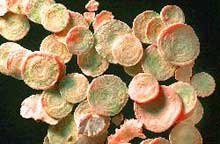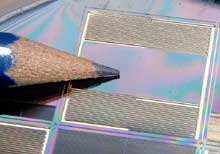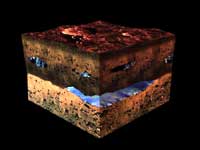Search Results for: search.php
Genetic engineering could salvage once-promising anti-cancer agents
A group of anti-cancer agents that once produced dismal results in clinical trials could once again be a promising tool in fighting the deadly disease, thanks to research by a team of chemists at the University of Washington and in Germany.
The agents, called maytansinoids, were first discovered in the 1970s when scientists looked for tumor inhibitors in a rare Ethiopian plant. The same group of maytansinoids was later isolated from a new bacteria species. The compounds held great promise b

Fossils Point the Way to Black Gold
Drilling for oil is expensive – and only too often unsuccessful: in 80 to 90 per cent of all attempts the drill head ends up in worthless sediment rather than hitting the black jackpot as intended. In this way, with every unsuccessful drilling, companies squander several million euros. Yet there is an alternative: the use of tiny fossilised single-celled organisms can reveal to the expert where prospecting for oil is worth while, a dying art at which only a few specialists worldwide still remain prof

Botanists Discover New Conifer Species in Vietnam
An unusual conifer found in a remote area of northern Vietnam has been identified as a genus and species previously unknown to science. The limestone ridges where the tree grows are among the most botanically rich areas in Vietnam, said Daniel Harder, currently director of the University of California at Santa Cruz (UCSC) Arboretum and a co-discoverer of the new species. The discovery is published in the current issue of the journal Novon.
“Biologists don’t need to contemplate finding life

Marsquake detection sensors will take search for water underground
Researchers at Imperial College London have just begun a 5-year project to design and build tiny earthquake measuring devices to go to Mars on the 2007 NetLander mission.
Unlike the instruments on next year`s European Mars Express/Beagle II mission, the Marsquake sensors will be the first to look deep inside the planet.
The internal structure of Mars is a key to understanding some fundamental questions about the planet including whether life ever existed there.
The sensors are c

Mars Express has the sophisticated science to find the water ice on Mars
“The presence of such a large amount of water ice under Mars`s surface is very surprising. Especially so close to the surface!” says Gerhard Schwehm, Head of the Planetary Missions Division at ESA. The team working on ESA`s Mars Express, the next mission to the Red Planet, is thrilled by NASA`s Mars Odyssey detection of hydrogen-rich layers under the Martian surface. This hydrogen indicates the presence of water ice in the top surface of the Martian soil in a large region surrounding the planet`s so
Lift off for Eddington Mission to look inside the stars and search for planets like Earth
“It is not too much to hope that in the not too distant future we shall be competent to understand so simple a thing as a star” (Arthur Eddington 1926)
Following a press conference this morning (Monday 27 May 2002) in Paris, the European Space Agency confirmed the establishment of the Eddington Mission as part of its new Science programme. Astronomers, led by Professor Ian Roxburgh of Queen Mary, University of London, proposed the mission in 2000, and the Eddington Satellite is to be